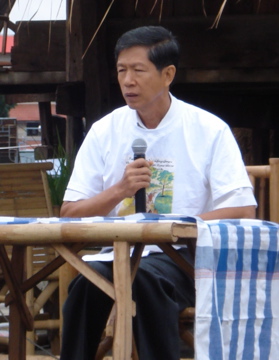I approached Slow Food’s Terra Madre with ambivalence. My fellow young farmers in New York called the organization an “eating club.” I was frustrated because my Thai friends from the Alternative Agriculture Network were not attending the event due to problems with paperwork. I didn’t know what to expect from the event – would the people I meet really care about food being “good, clean and fair”? Or, would the “good” take up most of their effort? Yet I also admired Slow Food for it’s explicit belief that “good food” (or “sustainable” or “fair”) should actually taste good. This same value is one that I see within the AAN and other farmer-based organizations working for a better food system.
Posts Tagged ‘Food Sovereignty’
UNCHR on the Right to Food
In In Solidarity on 10/07/2010 at 7:17 amfrom the UN High Commissioner for Human Rights
“Agroecology outperforms large-scale industrial farming for global food security,” says UN expert
BRUSSELS (22 June 2010) – “Governments and international agencies urgently need to boost ecological farming techniques to increase food production and save the climate,” said UN Special Rapporteur on the Right to Food, Olivier De Schutter, while presenting the findings at an international meeting on agroecology held in Brussels on 21 and 22 June.
Along with 25 of the world’s most renowned experts on agroecology, the UN expert urged the international community to re-think current agricultural policies and build on the potential of agroecology.
“One year ago, Heads of States at the G20 gathering in Italy committed to mobilizing $22 billion over a period of three years to improve global food security. This was welcome news, but the most pressing issue regarding reinvestment in agriculture is not how much, but how,” Olivier De Schutter said . Read the rest of this entry »
From The Atlantic – Thailand’s Other Protests: Pro-Sustainable Food
In Our Network on 08/06/2010 at 7:40 am
To view a slide show of images from Jarrett’s trip to visit the organic farmers of Ubon Ratchathani, click here.
In a remote Thai village, a 24-year-old New Jersey man named Bennett Haynes farms rice and vegetables. But Haynes also plays a more sinister role: in a recent farming folk opera about rice, he’s been cast by villagers in the part of sticky rice #6. This type of rice is an “improved” variety—a commodity crop sold by seed companies—that has supplanted local varieties.
In the opera, Haynes’s evil character wanders the countryside, stealing the hardy brown and black grains sown for centuries and infecting the paddies with his own seed. Sticky rice #6 is white, and so is Bennett, which makes the audience chuckle. Read the rest of this entry »
GRAIN: Say NO to the principles of “responsible” agro-enterprise investment promoted by the World Bank
In In Solidarity, Press Release on 25/04/2010 at 6:15 amState and private investors, from Citadel Capital to Goldman Sachs, are leasing or buying up tens of millions of hectares of farmlands in Asia, Africa and Latin America for food and fuel production. This land grabbing is a serious threat for the food sovereignty of our peoples and the right to food of our rural communities. In response to this new wave of land grabbing, the World Bank (WB) is promoting a set of seven principles to guide such investments and make them successful. The FAO, IFAD and UNCTAD have agreed to join the WB in collectively pushing these principles. [1] Their starting point is the fact that the current rush of private sector interest to buy up farmland is risky. After all, the WB has just finalised a study showing the magnitude of this trend and its central focus on transferring rights over agricultural land in developing countries to foreign investors. The WB seems convinced that all private capital flows to expand global agribusiness operations where they have not yet taken hold are good and must be allowed to proceed so that the corporate sector can extract more wealth from the countryside. Read the rest of this entry »
La Via Campesina Statement on Haiti
In In Solidarity on 31/01/2010 at 2:07 pmTo the governments and organizations gathered in Montreal on the situation in Haiti
The recent tragedy in Haiti shocked the people of the world for its destructive impact, the environmental and social consequences, and especially for the loss of human lives. Unfortunately, natural disasters are not new in that Caribbean country, which was impacted in 2008 by hurricanes Hanna and Ike.
มหกรรมประชาชนอีสาน “เพื่อการปกป้องทรัพยากรท้องถิ่น”
In Network Events on 28/01/2010 at 10:18 amโดย ทิพย์อักษร มันปาติ, 26 มกราคม 2553
ตลอดหลายสิบปีที่ผ่านมา ทิศทางการพัฒนาประเทศที่คิดมาจากศูนย์กลางของอำนาจรัฐ แนวคิดการพัฒนาที่เน้นเศรษฐกิจประเทศให้ก้าวหน้า โดยที่คนท้องถิ่นไม่ได้ร่วมกำหนดอนาคตความเป็นไปของตนเอง ได้เปลี่ยนภาคอีสาน ผืนดินที่เคยอุดมสมบูรณ์ด้วยทรัพยากรธรรมชาติ ป่าไม้ แหล่งน้ำและอาหาร ที่ประกอบสร้างวิถีชีวิตของคนท้องถิ่น สร้างวัฒนธรรม “เฮ็ดอยู่เฮ็ดกิน” พอยังชีพ อาศัยธรรมชาติ ดูแลธรรมชาติ ไปสู่ภาวะหนี้สินและความยากจนมากยิ่งขึ้น
การพัฒนาที่ไม่สนใจเรื่องความเท่าเทียม การพัฒนาที่มุ่งแต่จะสร้างความมั่งคั่งจากการขูดทรัพยากรทุกอย่าง ทั้งบนดินและใต้ดินออกมาขาย การพัฒนาที่ไม่รู้จักรากเหง้าของตัวเอง ได้บั่นทอนศักยภาพของคนในการเข้าถึงทรัพยากรมากยิ่งขึ้น ฐานทรัพยากรอาหารธรรมชาติ ภูมิปัญญาท้องถิ่นที่มีคุณค่าและสามารถพัฒนาให้สอดคล้องกับนิเวศวัฒนธรรมได้ อีกมาก ถูกรุกทำลายมากขึ้น และสิ่งเหล่านี้คงกลายเป็นเพียงเรื่องเล่า หากไม่ยืนหยัดรักษาไว้
วันนี้ ผืนดินอีสานกำลังเผชิญหน้ากับแผนโครงการต่างๆ อีกมากมาย เช่น เขื่อน เหมืองแร่ พืชเชิงเดี่ยว พืชพลังงาน นี่คือสิ่งที่คนถิ่นอีสานจำเป็นต้องรับรู้ เรียนรู้ เพื่อสร้างความเข้าใจให้ท่องแท้อย่างรอบด้าน และมาช่วยกันคิดหาหนทางให้คนท้องถิ่น ร่วมกำหนดความเป็นอยู่ต่อไปข้างหน้า
ข้าวพื้นบ้านกับอธิปไตยทางอาหารของชาวนาอีสาน
In Our Network, Research on 16/12/2009 at 9:25 pm
ข้าวพื้นบ้านกับอธิปไตยทางอาหารของชาวนาอีสาน
ปาฐกถาโดย เดชา ศิริภัทร
สวัสดีครับ เรียนท่านประธานเครือข่ายเกษตรกรรมทางเลือกภาคอีสาน ประธานสภาเทศบาลจ.ขอนแก่น พี่บำรุง บุญปัญญา เรื่องที่เตรียมมานี่เป็นเรื่องอยากพูดกับชาวนาอีสานโดยเฉพาะเป็นห่วงครับ หัวข้อเรื่อง “ข้าวพื้นบ้านกับอธิปไตยทางอาหารของชาวนาอีสาน”
คำว่าอธิปไตยทางอาหารคืออะไร ถ้าเป็นประเทศที่ไม่เคยเป็นเมืองขึ้นใครสามารถตัดสินใจเองได้เรื่องอาหาร แต่ถ้าไม่สามารถตัดสินใจได้ว่าจะกินอาหาร เมื่อไหร่ นั่นคือ “เมืองขึ้นทางอาหาร”
เข้าใจยากนะครับ เพราะตอนนี้มีของกินมาก ทั้งไก่ เนื้อหมู แต่ทั้งหมดมาจากฟาร์ม คำถามคือขณะนี้เรามีโอกาสกินผักพื้นบ้านไหม แตงโมพื้นบ้านที่ไม่ใส่ยา มีโอกาสได้กินไหม กะหล่ำปลี ที่เป็นพันธุ์พื้นบ้าน ไม่ใส่สารเคมี มีไหม ถั่วเหลืองที่จะกิน มีไหมที่ไม่ใช่จีเอ็มโอ ข้าวโพดในตลาดที่ไม่ใช่ลูกผสมมีไหม ไม่มีแล้ว เราไม่มีอธิปไตยทางอาหารแล้วเหลือสุดท้ายคือ ข้าว เดี๋ยวนี้ยังมี ข้าวอีตม อีตมใหญ่ ข้าวเล้าแตก ข้าวนางนวล แต่เชื่อไหม ถ้าเราไม่จัดงานรณรงค์แบบนี้ อีกหน่อยก็จะเป็นข้าวซีพี 350 ข้าวไบเยอร์ 6300 เพราะกระบวนการยึดครองทางอาหารเป็นแบบเดียวกันแบบเดียวกับที่เกิดกับข้าวโพด ซึ่งเดี๋ยวนี้มีแต่ซุปเปอร์สวีท หรือข้าวโพดเลี้ยงสัตว์ รัฐบาลใจดี พัฒนาเป็นสุวรรณ 12 ตอนนี้ เหลือพันธุ์เบอร์ต่างๆของบริษัท พันธุ์พื้นบ้านพันธุ์รัฐบาลหายไปหมด Read the rest of this entry »
Food Sovereignty Now!
In Our Network on 22/11/2009 at 1:15 pmLetter to the Coalition of Immokalee Workers
In In Solidarity on 10/09/2009 at 2:05 pmTo the Coalition of Immokalee Workers on the eve of your annual encuentro,
The Alternative Agriculture Network – Esan (AAN) is a network of small-scale farmers in northeastern Thailand, made up of more than 3,000 families. We are a movement of farmers, activists, NGOs and organizers. We’ve come together to support independent careers, self-reliance, creating power and control over production inputs, and access to resources. We work together on preserving and expanding local seeds for use in alternative agriculture. We create spaces in the market to promote safe food for urban consumers. We monitor agriculture and trade policies and push for policies that represent our interests. We resist and struggle against policies that are obstacles in the development of family and community self-reliance (for example, GMO technology and corporate-controlled contract farming systems). Read the rest of this entry »



